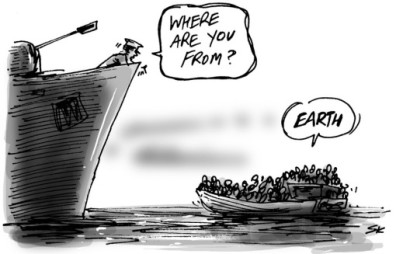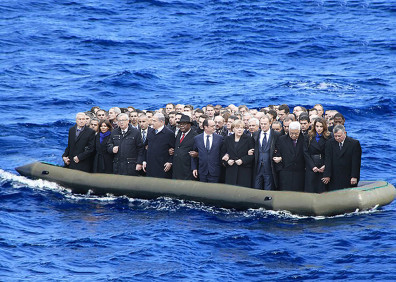What they don’t want you to know about Immigration (Final Post)
parker.hansen
Way back when I did my first blog post on the Syrian Refugee Crisis. Regrettably it’s only gotten worse since then. So I’ve decided to take a look at the actual economic and security effects of immigration, not what you hear in the media, through the lens of all our discussions and my own research. Casey’s final post goes into much more detail about security, so check that out too! I also follow a Facebook page, called Humans of New York. They recently interviewed groups of refugees who have been approved to travel to the United States. (One of which is the family shown in the cover photo) I strongly encourage everyone to read about their journey.
So, what is the media saying? If you’ve watched the news in the past week you know there is a very real concern that some of these migrants are Islamic State members. You also know that people coming over are just more competition for the same scarce jobs. We’ve heard this rhetoric before though, with Irish immigration, Mexican Immigration, and every other time people have come to live in the United States. We can peel back these layers and take a look at what actually happens.
First, some information about the economy. The United States is a postindustrial advanced democracy, which pretty much just means most of our jobs are in the service sector and we have some form of redistribution going on. The redistribution is the key part. In the United States the most known redistribution program is medicare. Well, we have a looming crisis on the horizon. Not enough money is going into the program through taxing the working population to provide the level of support we want for the non-working population. Just from the previous sentence, two solutions emerge. We can raise taxes, cut benefits, or both. Both actions have their pros and cons. The thing is, we have a scientifically proven third option to add more money to these programs without raising taxes or cutting benefits. You guessed it, immigration. Adding more people to the workforce raises the amount of taxes being collected without actually raising taxes. Some countries have caught onto this. (Ever wonder why Germany takes the most Syrian refugees compared to any other country?) Germany also happens to be in the middle of this redistribution crisis.
So, why aren’t we accepting immigrants to help our economy in the long run? Well, that’s where the security issue comes into play. If history has shown one thing, it’s that our nation of immigrants hates immigrants. The potential for Islamic State militants to be among the crown isn’t helping matters at all. Thankfully, research has been done on this as well. Turns out, immigrants just want a safe place to live, work, have children. Most violence around immigrants is actually directed at the immigrants themselves from citizens of the host country. Just check the number of property crimes against mosques if you don’t believe me. The truth is, the vetting process is so intensive and so incredibly selective that any militants could smuggle themselves into the country much faster then the time it takes to get a state department interview scheduled. (Which, in case you’re wondering, takes a long time).
In the end, economic and security issues seem secondary to preserving and helping other people. But if people really need evidence to justify helping, we can provide that. I’ll leave you with the picture I used in my first blog post which, in my opinion, really drives to the heart of the issue.
References
Rudolph, Christopher (2003). Security and the Political Economy of International Migration. American Political Science Review, 97(4) 603-620
Razin, A., Sadka, E., Swagel, P. (1998). Tax Burden and Migration: A Political Economy Theory and Evidence. National Bureau of Economic Research, 6734
Fitzgerald, J., Leblang, D., Teets, J. (2014). Defying the Law of Gravity: The Political Economy of International Migration. World Politics, 66(03) 406-465
Lekies, K., Cascante, D., Schewe, R., Winkler, R. (2015) Amenity Migration in the New Global Economy. Society and Natural Resources, 28(10) 1114-1151
Photo: http://i100.independent.co.uk/article/the-cartoon-that-sums-up-the-worlds-migrant-crisis–g12atJpSWZ
Featured Image: Humans of New York


